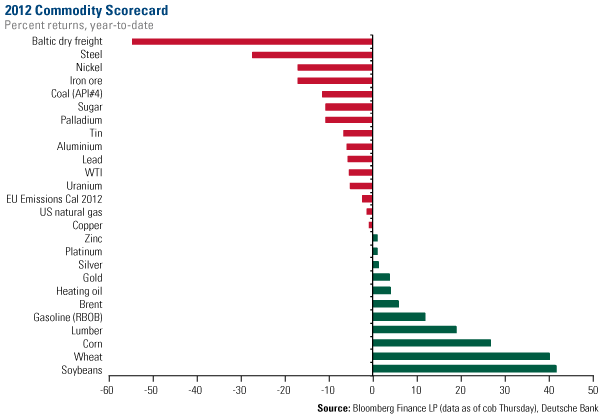Energy and Natural Resources Market Radar (August 13, 2012)

Strengths
- The Global Resources Fund gained an additional star from Morningstar and is now a 4-star overall rated fund as of July, 31 2012. This overall rating is out of 121 natural resources peers.
- Copper futures traded flat on the week as data out of China showed that copper imports rebounded in July from the lowest level in 10 months, to 366,548 metric tons, the General Administration of Customs said on its website. This was 5.9 percent higher than in June, and 20 percent higher than a year ago, customs data compiled by Bloomberg show.
- Soybean imports by China, the world’s biggest buyer, gained for a fifth month even as futures in Chicago climbed to a record. Arrivals totaled 5.87 million metric tons in July, the General Administration of Customs said on its website today.
Weaknesses
- BHP Billiton Ltd. (BHP) has moved to cut jobs at a regional office in northeastern Australia that handles planning for its metallurgical coal division in an effort to tackle slumping prices for the steelmaking commodity and increased costs.
- Data from China's customs department shows July iron ore imports falling slightly month-over-month to 57.87 million tons from 58.31 million tons last month. Analysts at Dahlman Rose & Co. expect further declines in the upcoming months as demand for iron ore cargoes has slowed and Chinese mills begin to reduce steel production, albeit slowly.
- Natural gas futures fell to a four-week low around $2.80 per mmbtu on lowered expectations of demand for air-conditioning as weather forecasters see cooling temperatures next week.
Opportunities
- Barclays highlighted tightness in the oil market due to supply outages which are mounting both among OPEC and non-OPEC producers. Along with technical and structural shortfalls (Brazil’s June production was lower by 4.9 percent), pipeline linked disruptions are also dominating the reason for outages, and in that subset geopolitics remains the primary cause. Barclays noted Yemen's Maarib pipeline (100 thousand barrels per day) has just resumed flows following an 11-month outage, and it remains vulnerable to a repeat of the series of strikes seen in late 2011. This week has seen an explosion on the Kirkuk-Ceyhan pipeline impacting oil flows up to 300 thousand barrels per day, with repairs expected to take 10 days. This pipeline has come under repeated attacks in the past, but attacks have concentrated on the Iraqi side of the border. Overall, Barclays thinks these outages, along with the reduced availability of Iranian exports, continue to weigh down the supply side, supporting a constructive market balance going into the fourth quarter of 2012.
- Per Reuters, Russia's ministry of natural resources has drafted a bill that will facilitate the access of companies with foreign capital to mine its gold, platinum group metals (PGM) and diamond reserves, according to documents published on a ministry website. Russia's gold reserves account for about 10 percent of the global volume; its share in palladium accounts for 24 percent of global reserves.
- The United Nations called for a suspension of U.S. government-mandated ethanol output amid surging corn prices, the Financial Times reported. The U.S. will use about 40 percent of its corn for ethanol production because of the Congress-enacted mandate despite “huge damage” to the crop from the worst drought in at least half a century, the newspaper reported, citing Jose Graziano da Silva, director-general of the UN’s Food & Agriculture Organization. An immediate, temporary suspension of the ethanol mandate would allow more of the crop to be channeled toward food and feed uses, the FT cited Graziano da Silva as saying.
- China's transition to consumer-led economic growth is forecast to result in growing steel demand, peaking in 2030, as the world's largest consumer of many commodities moves away from investment-led growth, the chief economist of mining titan Rio Tinto (RIO) said this week.
Threats
- China's petroleum and chemical industry is expected to grow at a slower pace this year, dragged down by the losses in oil refinery businesses and weakening raw materials demand from export-oriented sectors, an industry federation said Monday. The industry is facing downward pressure, due to sluggish demand from export-oriented sectors such as textiles and toy manufacturing, as well as rising production costs, a growing tax burden and large-scale losses in the refinery and natural gas sectors, said Li Yongwu, chairman of the China Petroleum and Chemical Industry Federation.










